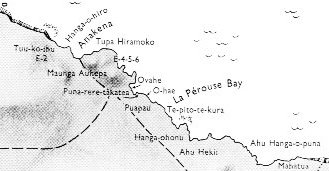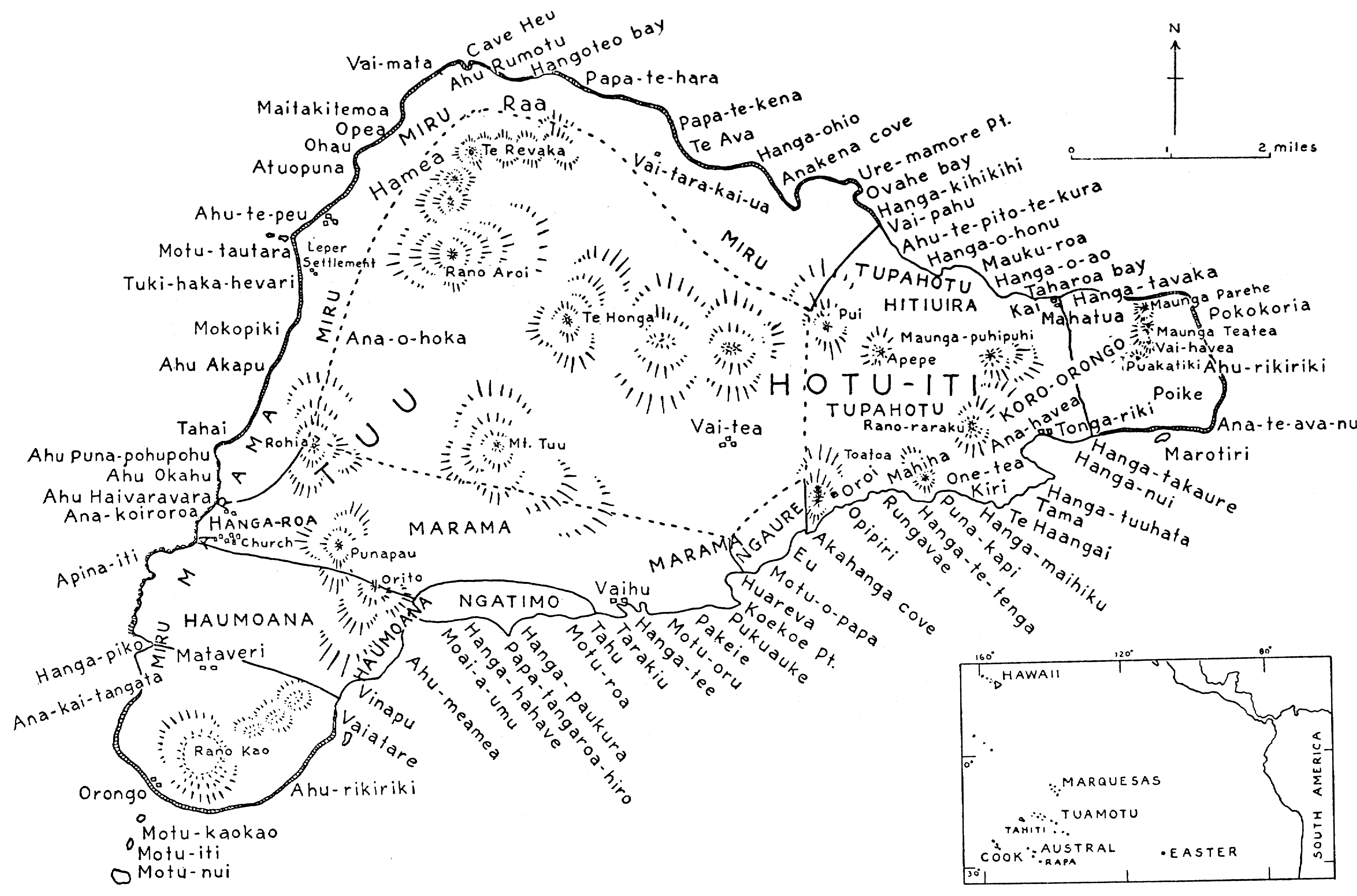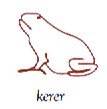112. They had tried to lift the Turtle but Easter Island was too far away from the equator and they could never have succeeded. The sky dome could not be raised high. Not even the Herculean powers of Kuukuu could do it: ... They all sat down and rested [on the plain of Oromanga], when suddenly they saw that a turtle had reached the shore and had crawled up on the beach. He [Ira] looked at it and said, 'Hey, you! The turtle has come on land!' He said, 'Let's go! Let's go back to the shore.' They all went to pick up the turtle. Ira was the first one to try to lift the turtle - but she didn't move. Then Raparenga said, 'You do not have the necessary ability. Get out of my way so that I can have a try!' Raparenga stepped up and tried to lift the turtle - but Raparenga could not move her. Now you spoke, Kuukuu: 'You don't have the necessary ability, but I shall move this turtle. Get out of my way!' Kuukuu stepped up, picked up the turtle, using all his strength. After he had lifted the turtle a little bit, he pushed her up farther. No sooner had he pushed her up and lifted her completely off the ground when she struck Kuukuu with one fin. She struck downward and broke Kuukuu's spine. The turtle got up, went back into the (sea) water, and swam away. All the kinsmen spoke to you (i.e. Kuukuu): 'Even you did not prevail against the turtle!'
The order was Sun (Ira), Moon (Raparenga), and Mars (Kuukuu) - time should follow the order of the week. The stage was Oromanga and this was the level beach with very white and light sands where the king should settle: ... Everywhere the dream soul looked around for a residence for the king. The dream soul went to Maunga Teatea and gave him the name 'Maunga Teatea A Hau Maka O Hiva'. The dream soul of Hau Maka looked around. From Maunga Teatea she looked to Rangi Meamea (i.e., Ovahe). The dream soul spoke the following: 'There it is - ho! - the place - ho! - for the king - ho! - to live (there in the future), for this is (indeed) Rangi Meamea.' The dream soul descended and came to Mahatua. She named the place 'Mahatua A Hau Maka O Hiva'. The dream soul continued to look around for a residence for the king. Having reached Taharoa she named the place 'Taharoa A Hau Maka O Hiva'. The dream soul moved along and reached Hanga Hoonu. She named the place 'Hanga Hoonu A Hau Maka O Hiva'.
The dream soul came to Rangi Meamea and looked around searchingly. The dream soul spoke: 'Here at last is level land where the king can live.' She named the place 'Rangi Meamea A Hau Maka O Hiva'. The mountain she named 'Peke Tau O Hiti A Hau Maka O Hiva'. The dream soul moved along a curve from Peke Tau O Hiti to the mountain Hau Epa, which she named 'Maunga Hau Epa A Hau Maka O Hiva'. The dream soul went to the other side of the mountain Hau Epa. As soon as the dream soul looked around, she saw the sand (beach), which was very white and light. She remained there and explored everything. After she had looked around carefully, the dream soul of Hau Maka said, 'Ah! This is the place that will serve as a residence for the king. She named the place 'Oromanga A Hau Maka O Hiva' and also named the neighboring bay 'Hanga Moria One A Hau Maka O Hiva' ... The dream soul had looked ahead from Maunga Teatea towards Rangi Meamea and had seen this place from afar, viz. from high up in the northeast corner where there were 3 prominent peaks marking change of rule:
... On the following day, 20 November 1770, Commander José Bustillo took formal possession of Easter Island 'in the name of the King and of Spain, our Lord and Master Don Carlos the third', renaming the island 'San Carlos'. Several hundred Rapanui - probably members of the Koro 'o 'Orongo tribe of the eastern 'Otu 'Iti - observed the ceremony not far from Poike's parasitic cones Parehe, Teatea, and Vai 'a Heva, on the tops of which the Spaniards had planted three crosses. Following three boisterous 'Viva el Rey!' for each cross, the land party let off three salvos of musketry, whereupon the two Spanish vessels San Lorenzo and Santa Rosalia responded with 21 cannon salutes. Spain's foremost historian of the Pacific, Francisco Mellén Blanco, has written of the event: 'The spectacle must have been awe-inspiring for the islanders. The parade of uniformed soldiers; the fluttering flags; the chaplains in their surplices chanting out the litany; the beating of drums, and the trilling of fifes must have left a lasting impression on all the natives who witnessed the procession' ... From counting by the Moon (177 = 6 * 29½) to counting by the Sun (180 = 6 * 30) there was a gap of 3 dark days: ... In China, every year about the beginning of April, certain officials called Sz'hüen used of old to go about the country armed with wooden clappers. Their business was to summon the people and command them to put out every fire. This was the beginning of the season called Han-shih-tsieh, or 'eating of cold food'. For three days all household fires remained extinct as a preparation for the solemn renewal of the fire, which took place on the fifth or sixth day after the winter solstice [Sic!] ... ... On Easter Eve the fire all is quencht in every place, // And fresh againe from out the flint is fecht with solemne grace. Then Clappers cease, and belles are set againe at libertée, // And herewithall the hungrie times of fasting ended bée ...
Furthermore, there were 3 islets outside in the sea in the southwestern corner of the island. And the 3 salvos of musketry were echoed by 3 * 7 cannon salutes from the pair San Lorenzo and Santa Rosalia out at sea. The knew what they were doing in those times. He Anakena was the Easter Island name for July and in January (Tua haro) the pair of halfmonths were named Mahatua and Taharoa:
We can identify Tua haro with the month beginning with Maha-TUA and ending with Ta-HARO-a, which should be enough to connect the rest of the dreamsoul stations with the months in our calendar. Tua haro was the month which was at the back side (tua) of the old year, the month which had been stretched out (haro) beyond Pua Katiki and Maunga Teatea - as if towed ahead by the current of time.
The month of Janus preceded the pair Hanga Hoonu and Rangi Meamea which were in February. The name Te-hetu'u-pú should mean there was a hole (pu) for the star (te hetu'u) in February. But in C the Heavenly Gate (a hole in the sky) was placed 84 days after 0h because at the time of rongorongo ζ Tauri had been pushed (towed) ahead in the calendar from day 100 to day 164. Or we could say that in APRIL 10 (100) the Heavenly Gate had returned to visibility after having been too close to the Sun since its true heliacal date in 100 - 16 = 84 (MARCH 25 = the Julian equinox):
However, this will still not explain why it was the month of February which was named Te-hetu'u-pú and not March. But we can understand that on Tahiti this gateway in February was regarded as a hole of exit and not as a hole of entrance, because here was the leading star in Columba (the Wood Pigeon, Kereru):
... Now every morning at daybreak, Taranga used to wake up before her children and leave the house, and vanish until night. The older brothers were used to this, they knew that their mother was there at night but gone in the morning, but little Maui was not used to it and he found it very annoying. At first he thought in the mornings, 'Well, perhaps she has only gone to prepare some food for us.' But no, she really was gone, she was far away. In the evening, when her children were all singing and dancing in the meeting house as usual, she used to return. And after the dancing she called young Maui to her sleeping mat, and this happened every night. And as soon as the daylight came she disappeared again. One day Maui asked his brothers to tell him where their mother and father lived. He said he wanted to visit them. They said they did not know. 'How can we tell?' they said. 'We don't know whether they live up there somewhere, or down below, or over there.' 'Well, never mind,' said Maui, 'I'll find them for myself.' 'Nonsense,' they said, 'how can you tell where they are, you, the youngest of all of us, when we ourselves don't know? After that first night when you turned up in the meeting house and made yourself known to us all, you know that our mother slept here every night, and as soon as the sun rose she went away, and she came back at evening, and this is how it always is. How can we tell where she goes?' Now when Maui had this conversation with his brothers he had already discovered something for himself. During the previous night, as his mother and brothers were all sleeping, he had crept out and stolen his mother's skirt, her woven belt, and her warm, feathered cloak, and had hidden them. Then he had taken various garments and stopped up all the chinks around the doorway of the house and of its single wooden window, so that the first light of day would not get in and Taranga would not wake in time to go. When that was done he could not sleep. He was afraid his mother would wake up in the dark and spoil the trick. But Taranga did sleep on. When the first faint light appeared at the far end of the house, Maui could see the legs of all the other people sleeping, and his mother was sleeping too. Then the sun came up, and Taranga stirred, and partly woke. 'What kind of night is this,' she wondered, 'that lasts so long?' But because it was dark in the house she dozed off again. At last she woke up properly, and knew that something was wrong. She threw off the cloak that covered her and jumped up, with nothing on, and went round looking for her skirt and belt. Little Maui pretended to be fast asleep. Taranga rushed to the door, and the window beside it, and pulled out all the things that Maui had used to stop them up. When she saw that the sun was already in the sky she muttered some angry things and hurried out, holding in front of her a piece of old flax cloak that Maui had used to stop up the door. Away she ran, crying and whimpering in being so badly treated by her children. No sooner was she out of the house than little Maui was on his knees behind the sliding door, which she had closed behind her as she left. He was watching to see which way she went. Not far away he saw her stop and pull up a clump of rushes. There was a hole under it, which she dropped into. She pulled the rushes into place behind her, and was gone. Maui slipped out and ran as fast as he was able to the clump of rushes. He pulled it and it came away, and he felt a wind against his face as he looked through the hole. Looking down, he saw another world, with trees and the ocean, and fires burning, and men and women walking about. He put the rushes back, and returned to the house and woke his brothers, who were still fast asleep. 'Come on, come on! Wake up!' he cried. 'Here we are, tricked by our mother again!' So they all got up, and realised from the height of the sun that they had overslept. That was the day when Maui asked them to tell him where his parents lived. He did not admit what he had seen that morning. And they said they did not know, and he would never know either ... So the hole of exit should be in February and not in March where instead the Sun would enter (although as viewed from a point north of the equator). On Easter Island Te Hetu'u Pú was at the opposite side of the year, corresponding to the month of August north of the equator. It was a month when the nights grew longer. The idea of Taranga sleeping too long was not far fetched. In February and in Roman times, however, the custom was to make the women wake up: ... At the beginning of 44 B.C. - when Ceasar was still alive - the Senate decided to raise statues of him in all the temples and to sacrifice to him on his birthday in the month Quintilis, which in honour of him was renamed July. He was raised to the status of a god (among the other gods of the state) under the name Jupiter Julius. Marcus Antonius, who this year was consul together with Ceasar, became high priest and responsible for the ceremonies. In the middle of February, at the time of the old feast of Lupercalia, he ran around naked (except for a girdle), and whipped the Roman ladies with thongs made from goat-skin [februa], in order to promote their fertility ...
The Polynesian languages do not allow words to end in a consonant like -r, therefore the Egyptian little shape-shifting tadpole should be pronounced kereru. ... the vowel is the skeleton of every Polynesian vocable, a fixed value, structural entity subject only to secular modification and that but rarely. On another occasion I have registered my impression of the Polynesian vowel: A man with a quick ear and an obedient tongue may, as the result of long discipline, acquire almost perfect use of the Samoan consonants, but it is most probable that no Caucasian has mastered the art of the Samoan vowels. It is as in their music; the intervals, the supertones and the fractions of the tone are developed on a system which we find it impossible to aquire. It establishes a new group of units of vibration of the vocal cords, for which the fundamental diapason of our own speech is not set in unison.* *17 Journal of the Polynesian Society, 87. Withdrawn by amputation from the context which expressed the purpose which the last sentence was designed to serve this may now appear misleading. It should be understood that the variety does not obtain in definitely measurable vibration of the vocal cords, but does obtain in the mass of overtones derivable from changes in the form of the head cavities, whether singly or in conjunction, acting as soft-walled sound-chambers. Holding this opinion I must discountenance any idea of emptiness in the vowel tract. It seems empty only for the reason that the collectors of the vocabularies upon which our studies are based either have failed to catch the rich shadings of the vowels through ears trained to find the strength of speech in the consonants, or have recognized their inability to represent them by any of the type resources at their command. We who can make the type fairly speak for us must commiserate these poor missionaries with their shabby fonts. I might evaluate these vowels by proper symbols in several of the languages under collateral review, but that would remain unsatisfactory because incomplete. In fact, before these languages have become too far corrupted, records should be taken phongraphically, so that a careful study may be made and a common system of expression devised in order that their full vowel beauty may be represented as an object at which to aim, even though we may fall short of the mark ...
|
||||||||||||||||||||||||||||||||||||||||||||||||||||||||||||||||||||||||||||||||||||||||||||||||||||||||||||||||||||||||||||||||||||||||||||||||||||||||||||||||||||||||||||||||||||||||||||||||||||||||||||||||||||













